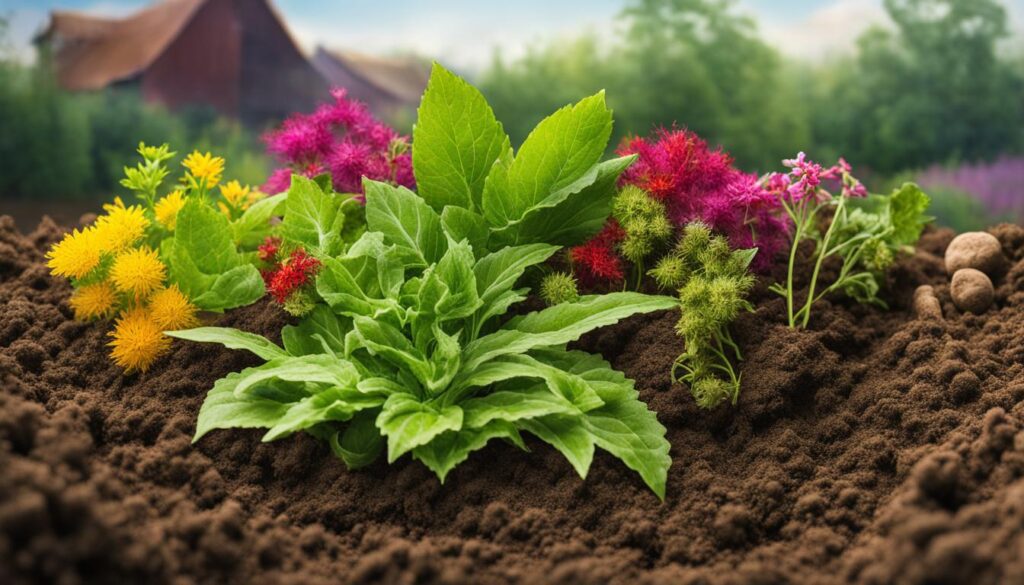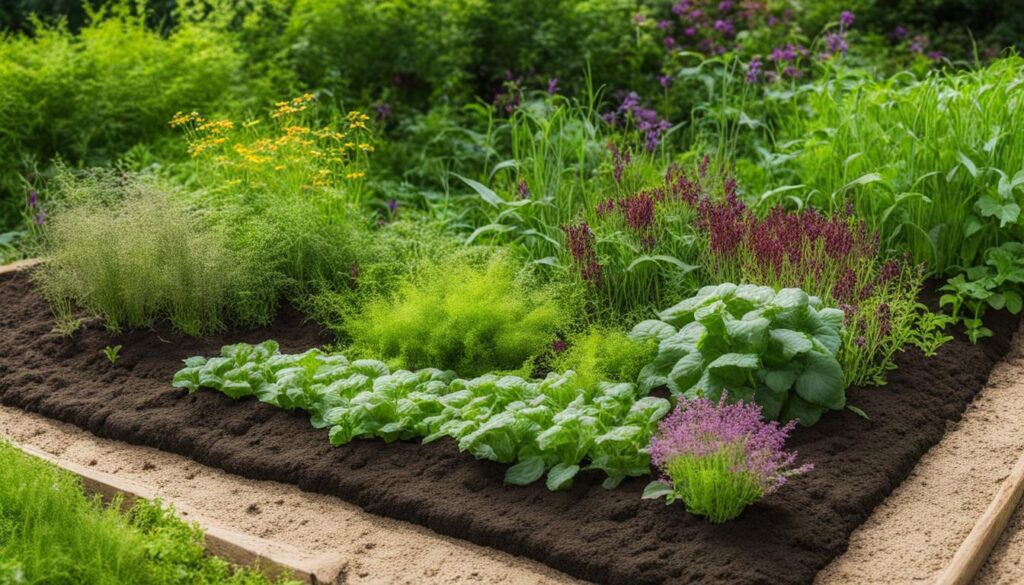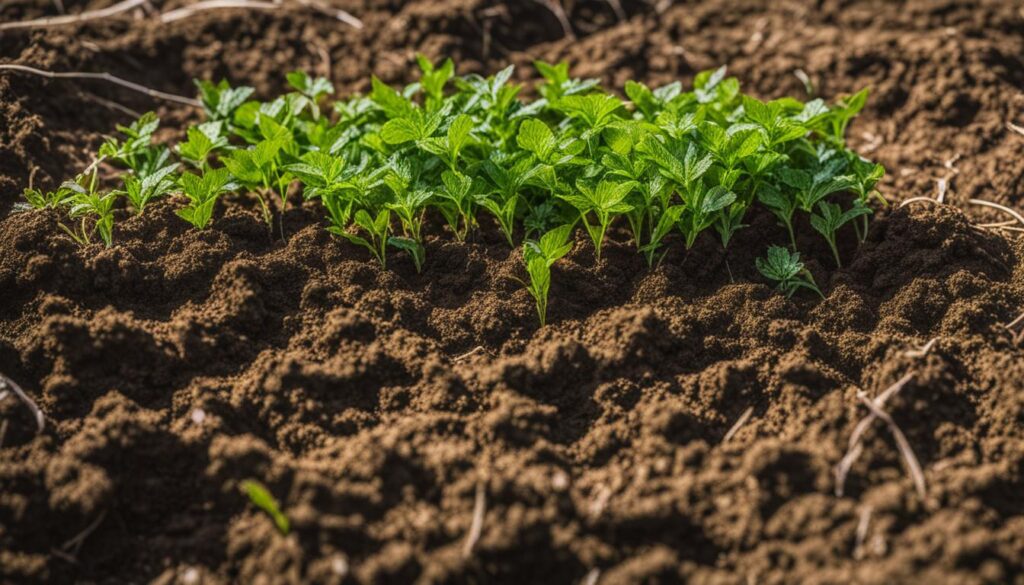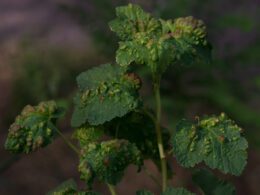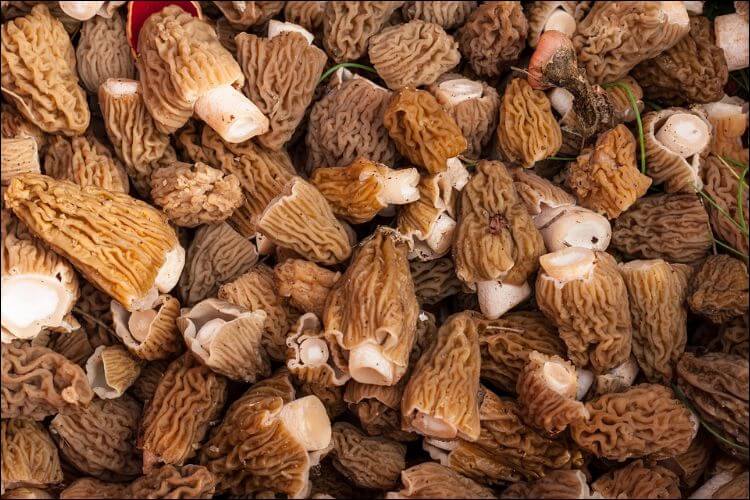Welcome to our insightful article on the often-misunderstood world of weeds. While they may be considered pests in your garden, weeds actually offer a range of benefits that go beyond their notorious reputation. In fact, these resilient plants play a crucial role in soil enrichment and contribute to the overall health of your garden. So let’s dive in and discover the hidden advantages of these seemingly unwanted guests.
Key Takeaways:
- Weeds thrive in specific soil conditions and work to bring the soil back into balance.
- They provide nutrients and water to microbes and plants, break up hardpans, and control erosion.
- Weeds act as a diagnostic tool for soil health and provide homes and food for microbes and animals.
- They support pollinators and wildlife by providing essential food sources and habitats.
- Weeds contribute to soil enrichment, improve fertility, and promote healthy plant growth.
Weeds as Pollinator Support
Weeds play a crucial role in supporting pollinators such as bees, butterflies, moths, and other beneficial insects. In fact, over 180,000 different plant species worldwide rely on pollination, and more than 1,200 crops depend on it for their reproduction and survival. Weeds serve as an essential food source for pollinators, especially in the early months of spring when other flowering plants may be scarce.
By allowing certain weeds to flourish, you can provide valuable floral resources for pollinators in your garden or natural habitat. Bees, for example, require a diverse range of pollen and nectar sources to thrive and fulfill their role as pollinators. Weeds offer an abundant supply of these essential food sources, ensuring that pollinators have the sustenance they need to support healthy ecosystems.
Furthermore, weeds not only benefit pollinators but also support wildlife as a whole. Weeds provide seeds for birds and serve as habitats for animals like deer, rabbits, and gophers. By embracing weeds in your garden or natural landscape, you can contribute to the overall well-being and biodiversity of your ecosystem.
The Importance of Weeds for Pollinators
Although weeds are often considered bothersome, they play a vital role in sustaining the delicate balance of our natural world. So the next time you spot a weed in your garden, pause and consider the valuable role it plays in supporting pollinators and wildlife. By understanding the importance of weeds and incorporating them into our landscaping practices, we can create thriving habitats and contribute to the overall health and sustainability of our environments.
Weeds and Soil Health
Weeds can provide valuable insights into the health of your soil. By understanding the indicators that weeds can offer, you can make informed decisions about the nutritional balance and overall condition of your soil. Additionally, weeds play a crucial role in transferring nutrients from the soil to other plants in the ecosystem.
The Role of Weeds as Indicators
Weeds are often pioneers, appearing in areas where the soil conditions are imbalanced. Different weeds thrive in specific soil conditions, and their presence can indicate deficiencies or excesses in nutrients such as nitrogen, phosphorus, potassium, and more. By identifying the types of weeds growing in your garden or field, you can gain valuable insights into the specific nutrient imbalances that may exist.
For instance, the presence of certain weed species like clover, chickweed, or plantain can indicate low nitrogen levels in the soil. Weeds like dandelion or sorrel can suggest soil acidity issues, while others such as lambsquarters or pigweed may be indicators of nutrient-rich soils.
“Understanding the types of weeds growing in your garden is like having a secret language with your soil. By deciphering the messages that weeds send, you can address imbalances and promote soil health.” – Dr. Jane Gardner, Soil Scientist
Nutrient Transfer from Weeds to Plants
As weeds grow and eventually die, their roots break down and decompose, releasing vital nutrients back into the soil. This process benefits the surrounding plants by making these nutrients more readily available for uptake. Weeds can also help improve soil structure by creating pathways and tunnels for beneficial organisms like worms, which further enhances nutrient distribution throughout the soil profile.
Furthermore, weeds have the ability to store nitrogen, an essential nutrient for plant growth, in their tissues. When these weeds decompose, they release nitrogen back into the soil, effectively enriching it and benefiting the plants nearby. This nutrient transfer from weeds to plants is just one of the many ways that weeds contribute to the overall health and fertility of the soil.
| Weed Type | Main Nutrients Provided |
|---|---|
| Clover | Nitrogen |
| Dandelion | Calcium, magnesium, phosphorus |
| Lambsquarters | Calcium, potassium, magnesium |
| Pigweed | Nitrogen, phosphorus, calcium |
Weeds and Soil Enrichment
Weeds contribute to the organic matter content of the soil as they continually grow and die. This process increases the fertility of the soil and improves its overall health. The roots of weeds penetrate deep into the soil, breaking up hard-packed layers and creating channels for other plant roots to access nutrients and moisture.
One of the significant ways weeds improve soil fertility is through their nutrient-absorbing abilities. Weeds absorb nutrients from the soil, often drawing from deeper layers that other plants may not reach. As weeds die and decompose, these nutrients are released back into the soil, making them available for other plants to uptake.
In addition to providing nutrients, weeds also help retain moisture in the soil. Their extensive root systems act as a sponge, absorbing and retaining water, which benefits surrounding vegetation during periods of drought or limited rainfall.
Their ability to enrich the soil, break up compacted layers, and retain moisture make weeds valuable contributors to garden and agricultural ecosystems. Embracing weeds as allies in soil enrichment can significantly benefit plant growth and overall soil health.
Weeds and Erosion Prevention
Weeds play a crucial role in preventing soil erosion and stabilizing the ground. Their extensive root systems act as soil stabilizers, holding the soil in place and preventing it from being washed away. The web-like structure of weed roots forms a protective layer that keeps the soil intact, even during heavy rainfall or irrigation. This natural barrier helps to minimize soil washout and protect against erosion damage.
By breaking up the soil with their taproots, weeds improve its stability and structure, making it less susceptible to erosion. The roots create pathways and tunnels for water absorption, allowing it to penetrate deeper into the soil and reducing the impact of surface runoff. Weeds also help to break up hard-packed layers of soil, making it easier for other plant roots to access water and nutrients. Their intricate root systems promote healthy soil structure, preventing erosion and promoting overall soil health.
Furthermore, weeds contribute to the rejuvenation of degraded soils. As weeds grow and die, their decay releases essential nutrients into the soil, feeding microorganisms that further enhance soil health. This nutrient transfer helps to restore and replenish the soil, making it more fertile and capable of supporting plant growth. By nourishing the soil and providing a protective layer against erosion, weeds play a vital role in maintaining the integrity and health of the land.
The Benefits of Weed Roots as Soil Stabilizers:
| Benefits | Explanation |
|---|---|
| Prevents soil erosion | Weed roots form a protective layer that holds the soil in place, minimizing the risk of erosion caused by water or wind. |
| Improves soil structure | By breaking up the soil and creating pathways, weed roots enhance soil stability and promote healthy soil structure. |
| Absorbs water and reduces runoff | The intricate root systems of weeds allow for better water absorption, reducing surface runoff and preventing soil erosion. |
| Contributes to soil fertility | As weeds decay, they release essential nutrients into the soil, nourishing microorganisms and promoting overall soil health. |
“Weed roots are nature’s solution to preventing soil erosion and maintaining soil health. By harnessing their extensive root systems, we can protect our land from erosion damage and create a more resilient environment.”
Weeds in Agroecosystems
Weeds play a crucial role in supporting pollinators and benefiting ecosystems within agroecosystems. By allowing certain early winter weeds to flower, farmers can provide valuable floral resources for pollinators such as bees, butterflies, and flies. This helps sustain the populations of these essential pollinators, ensuring the successful reproduction of over 180,000 different plant species and more than 1,200 crops worldwide. Weeds act as a critical food source for pollinators, especially during the early months of spring when other nectar and pollen sources may be scarce.
Embracing weeds in agriculture can have numerous benefits for ecosystems as well. Weeds provide nectar and pollen for beneficial insects, promoting biodiversity and the overall health of the agricultural system. By nurturing a diverse range of plant species, weeds contribute to a balanced ecosystem where different organisms can thrive. This not only enhances the resilience of the agroecosystem but also supports the natural pest control mechanisms by attracting predators and parasitoids that keep pest populations in check.
Integrating weeds into agroecosystems requires a shift in mindset, viewing them not as nuisances but as valuable contributors to the overall health and sustainability of agricultural systems. By supporting pollinators and promoting biodiversity, weeds can help maintain the delicate balance necessary for a thriving and resilient agroecosystem.
Are There Any Benefits to Weeds, or Are They Just Bad for Plants?
Some weeds can actually benefit plant health by improving soil structure and providing natural ground cover. However, certain invasive weeds can deprive nearby plants of essential nutrients and water. It’s important to manage weeds effectively to maintain overall plant health and ecosystem balance.
Conclusion
Weeds may often be perceived as pests, but they offer numerous benefits in gardens and agricultural systems. By understanding their true value, you can adopt more sustainable and ecological practices that benefit both crops and the environment.
In gardens, weeds contribute to soil enrichment by increasing organic matter and improving soil fertility. They provide essential nutrients and moisture to surrounding vegetation, promoting healthy plant growth. Additionally, weeds act as natural barriers against soil erosion, preventing washout caused by irrigation, heavy rainfall, or severe weather conditions.
In agricultural systems, it is crucial to consider the role of weeds. They support pollinators by providing valuable floral resources and promote biodiversity by offering nectar and pollen to beneficial insects. Embracing weeds can contribute to the overall health and sustainability of agricultural systems.
So, instead of viewing weeds as nuisances, recognize their benefits. By working with the natural processes facilitated by weeds, you can achieve a balance that benefits both your garden and the larger agricultural ecosystem.
FAQ
Do weeds have any benefits in the garden?
Yes, weeds can provide multiple benefits beyond being considered pests. They help bring the soil back into balance, provide nutrients and water to microbes and plants, break up hardpans and control erosion, increase organic matter in the soil, act as a diagnostic tool for soil health, and provide homes and food for microbes and animals.
How do weeds support pollinators?
Weeds play a crucial role in providing food for pollinators such as bees, butterflies, moths, and other beneficial insects. Over 180,000 different plant species and more than 1,200 crops worldwide rely on pollination. Weeds serve as a fundamental food source for pollinators, especially in the early months of spring. Weeds also support wildlife by providing seeds for birds and serving as habitats for animals like deer, rabbits, and gophers.
Can weeds indicate the health of the soil?
Yes, weeds can indicate the health of the soil. Their presence and growth habit provide insights into the nutritional balance of the soil. As weeds die and decay, their roots break down and feed microorganisms and insects, making pathways and tunnels for worms. The breakdown of weeds releases essential nutrients into the soil, which other plants can absorb. Weeds also store nitrogen and carbon dioxide in the soil, improving air quality and mitigating the climate crisis.
How do weeds contribute to soil enrichment?
Weeds continually grow and die, contributing to the organic matter content of the soil. This process increases the fertility of the soil and improves its overall health. Weeds also break up hard-packed layers of soil with their taproots, making it easier for other plant roots to access deeper levels of the soil. They absorb nutrients and moisture from the soil and share them with surrounding vegetation, promoting healthy plant growth.
Do weeds help prevent erosion?
Yes, the roots of weeds, with their web-like structure, help hold the soil in place and prevent erosion. They break up the soil, improving its stability. Weeds act as a natural barrier against soil washout caused by irrigation, heavy rainfall, or severe weather conditions. Their fibrous roots create a protective layer that keeps the soil intact. Additionally, weeds contribute to the rejuvenation of degraded soils by feeding microorganisms that release essential nutrients into the ground.
How do weeds benefit agroecosystems?
Weeds are important components of agroecosystems as they support pollinators and promote biodiversity. By allowing certain early winter weeds to flower, farmers can provide valuable floral resources for pollinators. Weeds play a significant role in maintaining a healthy ecosystem by providing nectar and pollen for beneficial insects like bees, butterflies, and flies. Embracing weeds in agriculture can contribute to the overall health and sustainability of agricultural systems.
Why should we consider the role of weeds in gardening and agriculture?
Weeds offer numerous benefits in gardens and agricultural systems, despite their reputation as pests. They contribute to soil enrichment, provide food and habitats for pollinators and wildlife, improve soil structure, and prevent erosion. Understanding the true value of weeds can help gardeners and farmers adopt more sustainable and ecological practices. By working with the natural processes facilitated by weeds, it is possible to achieve a balance that benefits both crops and the environment.






